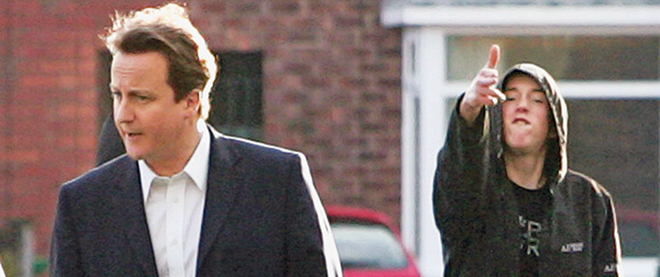David Cameron rides the riots
The British PM is promising to fix his country’s ‘broken society’—and Britons are listening
Photo by Martin Rickett/KEYSTONE Canada. (©) Copyright 2011 by PA Wire
Share

Last week, at a youth centre in the village of Witney, Oxfordshire, British Prime Minister David Cameron stood in front of a wall of messy graffiti and pledged to put his country’s “broken society” back to the top of his political agenda. It must have been a vindicating moment for a leader who has been roundly mocked, at times excoriated, for his long-held insistence that British youth are suffering from a moral malaise that would best be cured, not by increased social spending, but a bracing dose of good old-fashioned community involvement. Picking up litter in a local park, perhaps, followed by a vigorous round of neighbourhood pickup soccer.
In fact, in the wake of the recent riots that have shocked Britain, these were just some of the solutions Cameron was laying out in Oxfordshire that Monday, to an anxiously receptive public. It is all part of his planned “national citizen service,” a kind of voluntary-sector answer to Britain’s formerly mandatory military service—which, in the aftermath of the violence, there was some outlandish talk of reinstating. Paired with his carefully scripted tough talk of social and security “fight-back” and a major crackdown on gang crime, Cameron’s obsession with civic engagement, which seemed hopelessly quaint just weeks ago, is starting to look altogether more prescient. Indeed, his much-scoffed-at idea of a Big Society—the Tories’ flagship platform that, among other things, emphasizes smaller government, a bigger voluntary sector and devolution of power from Whitehall to councils—has never seemed more relevant.
After several days of making conciliatory noises, opposition Labour Leader Ed Miliband was back on the attack last week, trying to take hold of the crisis for himself. He mocked the Prime Minister in front of an audience at his alma mater, a public high school in north London, not far from where the riots began. Dismissing as “gimmicks” Cameron’s threats to harass gang leaders in their homes and adopt an American-style “zero tolerance” approach to policing, Miliband tried to paint the new “tough on crime” Cameron as a hypocrite. “A Prime Minister who used to say we ought to ‘hug a hoodie’ now says we ought to reform health and safety laws!” Miliband groused, referring to Cameron’s famous 2006 speech in which he urged an audience, “when you see a child walking down the road, hoodie up, head down, moody, swaggering, dominating the pavement—think what has brought that child to that moment.”
But in fact, judging by the public mood, Cameron’s past support of compassionate conservatism combined with his new cries of a need for tougher policing are helping him to gain and secure the coveted middle ground. As Times columnist Matthew Parris put it, “few of us can have felt like hugging the hooded morons we’ve been watching on television (there were moments many of us felt like shooting them), but don’t we also sense something pathetic and bleak in the condition of kids and youths for whom this looting counts as sport? These really are broken communities, broken families, broken people.”
The political road ahead for Cameron will not be without obstacles. Particularly worrisome is the growing divide within the Tory-led coalition over the issue of appropriate punishment for convicted looters. While Cameron has trumpeted his support for cutting benefits and evicting families of rioters and looters from publicly subsidized housing, the Liberal Democrats are opposed. Lib Dem deputy leader Simon Hughes characterized the measures as “knee-jerk,” and others warned of increased crime as a result.
But it appears the evictions will go ahead. The first notice was served in the London district of Wandsworth two weeks ago, to the single mother of an 18-year-old boy accused of violent disorder and burglary. And Cameron appears to be sticking to a hard line—not surprising, as it’s one that dovetails nicely with his mission to drastically cut public spending. Of the evicted families, he told the BBC, “Obviously they’ve got to be housed somewhere else—they’ll have to find housing in the private sector—and that will be tougher for them, but they should have thought of that before they started burgling.”
Similarly contentious are Cameron’s planned cuts to police services, which he has not backed down from despite the need for a surge during the riots, which saw 16,000 police, instead of the normal 6,000, flood onto London’s streets. While Cameron and other members of his government initially criticized police for not taking a tougher line, the Tories have since praised the forces’ handling of violence. Still, the rift prompted Sir Hugh Orde, president of the Association of Chief Police Officers, to angrily dismiss the role of politicians in the riots as an “an irrelevance.” Cameron is also facing opposition to his decision to hire former New York and L.A. police chief Bill Bratton to consult on how to deal with gangs. “I am not sure I want to learn about gangs from an area of America that has 400 of them,” Orde told the press. “It seems to me, if you’ve got 400 gangs, then you’re not being very effective.”
But the greatest challenge for Cameron will undoubtedly be finding a way to effectively deal with the festering social problems the riots have so starkly exposed. While the Tory far right is keen to characterize the disturbances purely as an isolated outburst of criminality and blame parents, the opposition would like to see more support for the underclass of disaffected youth who are, in large part, responsible for the violence. Cameron has pledged to “turn around the lives of 120,000 of the most troubled families” by the next election in 2015. That’s a whole lot of fixing of broken things. Let’s hope he’s feeling handy.